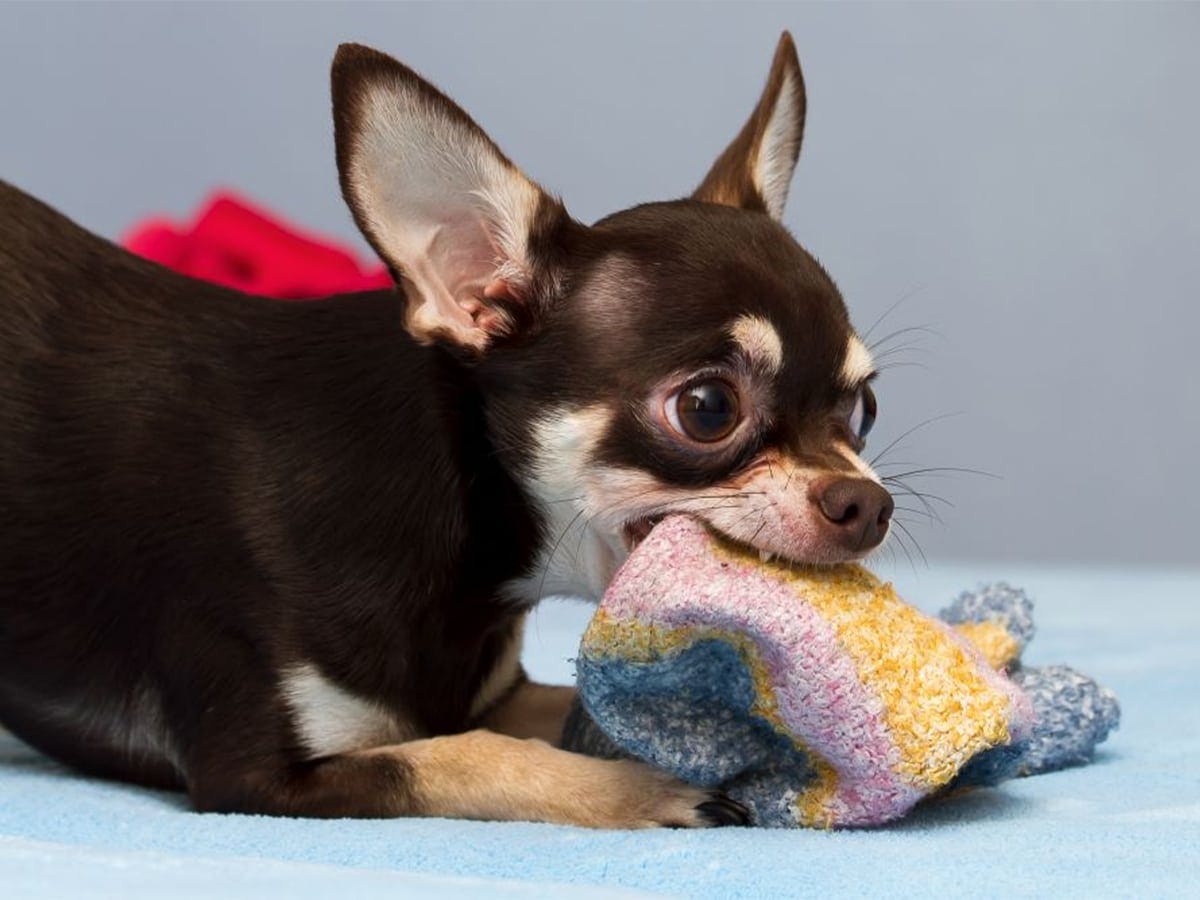Chihuahuas can exhibit various behavior problems, including excessive barking, aggression, and anxiety. Understanding these issues is crucial for effective training and care.
Chihuahuas are small dogs with big personalities. Their behavior can sometimes be challenging for owners. Common problems include barking excessively, showing aggression towards other pets, and experiencing separation anxiety. These issues often stem from their strong instincts and protective nature.
Proper training and socialization are key to managing behavior problems. Understanding the root causes can lead to effective solutions. Owners must be patient and consistent in their approach. With the right guidance, Chihuahuas can become well-adjusted companions. Addressing behavior problems early can improve the relationship between the dog and its owner, leading to a happier, healthier life for both.

Credit: ilovemychi.com
Introduction To Chihuahua Behavior
Chihuahuas are small dogs with big personalities. Understanding their behavior is crucial. They often display unique traits that can lead to challenges. Early intervention helps ensure a happy and healthy pet.
Common Traits
- Loyalty: Chihuahuas bond closely with their owners.
- Alertness: They are quick to bark at any noise.
- Playfulness: These dogs love to play and have fun.
- Stubbornness: They may resist commands at times.
- Protectiveness: They can be territorial and protective.
Chihuahuas often show a mix of these traits. Each dog is unique. Understanding these traits helps in managing their behavior.
Why Address Behavior Problems Early
Addressing behavior problems early is essential. It prevents issues from becoming serious. Early action leads to better training results.
- Improves relationships: Better behavior strengthens the bond.
- Reduces stress: A well-behaved dog causes less stress.
- Enhances safety: Good behavior keeps everyone safe.
- Promotes socialization: Early training helps with social skills.
- Encourages good habits: Good habits lead to a happy life.
Behavior problems can escalate quickly. Taking action now helps create a positive environment.
Barking And Howling
Chihuahuas are known for their lively personalities. Their barking and howling can be charming yet challenging. Understanding why they make these sounds helps in addressing the behavior.
Identifying The Triggers
Recognizing what causes your Chihuahua to bark or howl is crucial. Common triggers include:
- Strangers: Chihuahuas often bark at unfamiliar people.
- Noises: Loud sounds like sirens or fireworks can startle them.
- Loneliness: They may howl when left alone for too long.
- Excitement: Playtime or visitors can lead to excessive barking.
Watch your pet closely. Take notes on when they bark. This helps identify patterns and specific triggers.
Effective Solutions
Addressing barking and howling requires patience and consistency. Here are effective solutions:
- Training: Teach commands like “quiet” or “enough.” Use treats as rewards.
- Socialization: Expose your Chihuahua to various people and environments. This reduces fear-based barking.
- Exercise: Regular physical activity helps burn off excess energy. A tired dog is less likely to bark.
- Distraction: Provide toys or puzzles to keep them occupied. This can minimize attention-seeking barking.
- Calm Environment: Create a peaceful space. Use calming music or white noise to drown out loud sounds.
Each Chihuahua is unique. Experiment with different strategies to find what works best.
Aggression Issues
Aggression in Chihuahuas can be concerning. Small size does not equal a gentle temperament. Many owners face challenges with aggressive behavior. Understanding the root causes helps in managing these issues effectively.
Root Causes
Identifying the reasons behind aggression is crucial. Common root causes include:
- Fear: Chihuahuas may act aggressively when scared.
- Protectiveness: They often guard their owners and territory.
- Lack of Socialization: Limited exposure to other dogs or people leads to fear.
- Health Issues: Pain or illness can trigger aggressive behavior.
- Genetics: Some Chihuahuas may inherit aggressive traits.
De-escalation Techniques
Managing aggression involves specific techniques. Here are effective methods:
- Stay Calm: Your calmness helps soothe your dog.
- Avoid Confrontation: Do not approach aggressively.
- Use Positive Reinforcement: Reward good behavior with treats.
- Redirect Attention: Distract with toys or commands.
- Socialization: Introduce your Chihuahua to new people and pets.
Implementing these techniques can lead to a more peaceful environment.
Separation Anxiety
Separation anxiety is a common issue in Chihuahuas. These tiny dogs often form strong bonds with their owners. When left alone, they can feel scared and distressed. This behavior can lead to unwanted habits. Understanding separation anxiety helps in managing it effectively.
Symptoms
Recognizing the symptoms of separation anxiety is crucial. Here are some common signs:
- Excessive barking or howling
- Destructive behavior like chewing furniture
- Pacing or restlessness
- Excessive drooling
- House soiling even if they are trained
- Following you everywhere in the house
These behaviors can indicate your Chihuahua is stressed. Early detection is key for successful management.
Management Strategies
Managing separation anxiety requires patience and consistency. Here are effective strategies:
- Gradual departures: Practice leaving for short periods. Gradually increase the time.
- Comfort items: Provide a favorite toy or blanket for comfort.
- Interactive toys: Use puzzle toys to keep them busy.
- Calm environment: Create a safe and quiet space for your dog.
- Training: Teach basic commands to build confidence.
- Professional help: Consult a dog trainer or behaviorist if needed.
Consistency in these strategies can help reduce anxiety. Your Chihuahua will feel more secure and less stressed.
Toilet Training Challenges
Toilet training a Chihuahua can be tricky. They are small dogs with unique personalities. Some may resist training, leading to frustration. Understanding their behavior helps in overcoming these challenges.
Setting A Routine
Establishing a consistent routine is key. Chihuahuas thrive on predictability.
- Take your Chihuahua outside first thing in the morning.
- Feed them at the same times daily.
- Take them out after meals and naps.
- Always go outside before bedtime.
Using a specific spot helps them recognize where to go. Praise them immediately after they go outside. This creates a positive association.
Positive Reinforcement Methods
Positive reinforcement works wonders with Chihuahuas. They respond well to rewards.
| Action | Reward |
|---|---|
| Goes outside to toilet | Favorite treat |
| Stays calm during training | Praise and petting |
| Signals need to go out | Extra playtime |
Use a cheerful tone and give immediate rewards. This encourages them to repeat good behavior. Avoid punishment; it creates fear and anxiety.
Toilet training requires patience. Stay consistent, and your Chihuahua will learn. Celebrate small victories along the way.
Chewing And Destructive Behavior
Chihuahuas are small but energetic dogs. Their chewing and destructive behavior can be frustrating. Understanding why they chew is key. Many Chihuahuas chew to relieve boredom or anxiety. This behavior can lead to damaged furniture and belongings.
Understanding The Cause
Several factors contribute to a Chihuahua’s chewing habits:
- Boredom: Lack of stimulation leads to chewing.
- Anxiety: Stress can trigger destructive behavior.
- Teething: Puppies chew to relieve discomfort.
- Curiosity: They explore the world with their mouths.
Identifying the cause helps in addressing the issue effectively. Keep an eye on your Chihuahua’s environment. Look for patterns in their behavior.
Redirecting The Habit
Redirecting chewing habits can save your belongings. Here are some effective methods:
- Provide Chew Toys: Offer durable toys for chewing.
- Engage in Play: Spend time playing with your dog.
- Training: Teach commands like “leave it” or “no.”
- Limit Access: Keep tempting items out of reach.
Reward positive behavior with treats or praise. Consistency is essential in changing habits.
| Cause | Solution |
|---|---|
| Boredom | Provide interactive toys and playtime. |
| Anxiety | Use calming aids and create a safe space. |
| Teething | Offer soft toys designed for puppies. |
| Curiosity | Introduce safe items to explore. |
Understanding and addressing chewing behavior is crucial. With the right approach, you can help your Chihuahua thrive.
Leash Pulling During Walks
Leash pulling is a common problem for Chihuahua owners. These little dogs often feel excited during walks. They pull on the leash to explore their surroundings. This behavior can be frustrating and unsafe. Understanding the reasons behind leash pulling helps in finding solutions.
Training For Better Leash Manners
Training your Chihuahua for better leash manners is essential. Follow these simple steps:
- Start Indoors: Begin training in a quiet space.
- Use Treats: Reward good behavior with treats.
- Teach “Heel”: Use commands to guide them.
- Practice Short Walks: Gradually increase distance.
- Stay Consistent: Repeat training daily.
Patience is key. Celebrate small victories. Over time, your Chihuahua will learn to walk calmly.
Equipment That Can Help
Choosing the right equipment can make walks easier. Consider these options:
| Type of Equipment | Description |
|---|---|
| Harness | Reduces pulling pressure on the neck. |
| Head Collar | Gives better control over pulling behavior. |
| Training Leash | Provides flexibility and control. |
Choose equipment that fits your Chihuahua well. Proper fitting prevents discomfort. This helps make walks enjoyable for both of you.
Socialization With Other Dogs
Chihuahuas can be sensitive around other dogs. Proper socialization helps them feel safe and confident. Early interactions reduce anxiety and aggression. Understanding how to socialize your Chihuahua is essential for their well-being.
The Importance Of Early Socialization
Early socialization is crucial for Chihuahuas. It shapes their behavior and personality. Here are some key benefits:
- Reduces fear and anxiety in new situations.
- Encourages friendly interactions with other dogs.
- Promotes adaptability to different environments.
- Helps prevent aggressive behavior later in life.
Start socializing your Chihuahua at a young age. Positive experiences build their confidence. Make sure to expose them to various dogs and environments.
Safe Ways To Introduce New Dogs
Introducing your Chihuahua to new dogs requires care. Follow these steps for a safe introduction:
- Choose a neutral location for the meeting.
- Keep both dogs on a leash to maintain control.
- Observe body language for signs of stress.
- Allow them to sniff each other while maintaining distance.
- Gradually decrease the distance if both dogs are calm.
Be patient during the introduction. Some dogs may take longer to adjust. Reward both dogs for calm behavior. This encourages positive associations with each other.
| Behavior | Meaning |
|---|---|
| Wagging Tail | Happy and excited |
| Barking | Seeking attention or warning |
| Growling | Uncomfortable or threatened |
| Exposed Belly | Submissive or relaxed |
Understanding dog behavior is essential for safe interactions. Monitor both dogs closely. Early and positive socialization leads to happier and healthier Chihuahuas.
Conclusion: Creating A Happy, Well-behaved Chihuahua
Chihuahuas are lively and loving companions. Addressing their behavior problems is essential. A happy Chihuahua leads to a joyful home. Focus on training and understanding their needs.
Consistency Is Key
Chihuahuas thrive on routine and clear expectations. Here are important points for effective training:
- Set Clear Rules: Define what is acceptable behavior.
- Regular Training Sessions: Short and frequent sessions work best.
- Positive Reinforcement: Reward good behavior with treats or praise.
- Use the Same Commands: Consistent commands help them learn.
Stay patient and persistent. Chihuahuas may take time to adjust. Celebrate small victories along the way.
Seeking Professional Help When Needed
Sometimes, behavior issues need expert guidance. Consider seeking help in these situations:
| Situation | Recommended Action |
|---|---|
| Excessive Barking | Consult a dog trainer or behaviorist. |
| Aggression Towards People or Pets | Seek professional behavior modification. |
| Severe Anxiety Issues | Talk to a veterinarian about solutions. |
Finding the right help can lead to significant improvements. A professional can tailor a plan for your Chihuahua’s needs.
Creating a happy, well-behaved Chihuahua involves dedication. With the right approach, you can nurture a loving and disciplined companion.

Credit: ilovechihuahuas.medium.com
:strip_icc()/breed-profile-chihuahua-1117953-0cda9bfd4f4549279f5cc00ad0eebb59.jpg)
Credit: www.thesprucepets.com
Frequently Asked Questions
What Are Common Chihuahua Behavior Issues?
Chihuahuas often face issues like barking, aggression, and separation anxiety due to their small size and strong personalities.
How Can I Stop My Chihuahua From Barking?
Training techniques, like positive reinforcement and consistent commands, can effectively reduce excessive barking in Chihuahuas.
Why Is My Chihuahua So Aggressive?
Aggression in Chihuahuas can stem from fear, lack of socialization, or territorial instincts. Early socialization helps mitigate this.
Do Chihuahuas Have Separation Anxiety?
Yes, Chihuahuas are prone to separation anxiety due to their strong bond with owners. Gradual desensitization can help.
How To Train A Stubborn Chihuahua?
Use positive reinforcement, patience, and consistency. Short training sessions keep them engaged and encourage better behavior.
Conclusion
Addressing Chihuahua behavior problems is essential for a happy pet and owner. Understanding their needs and triggers can lead to effective solutions. Consistent training and socialization are key. With patience and love, you can nurture a well-behaved Chihuahua. Your efforts will result in a stronger bond and a more harmonious household.
